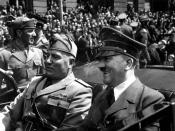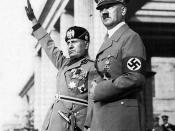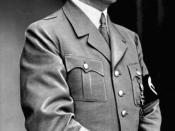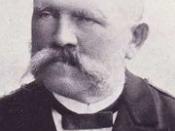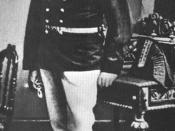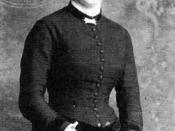The rationalization of Adolf Hitler:Product of the old Germany andShaper of the 3rd Reich StateWhen conducting a biographical review of Adolf Hitler, it is difficult to discern the historical fact of his life from the numerous historical theories accepted as fact, and the pseudo-psychological studies that attempt a look into the life and times of the man, but never fail to come up short on proof. Adolf Hitler grew up in one of the most tumultuous times in GermanyÃÂs history. Born on April 20th, 1889, to Alois Hitler, a successful customs official, and his third wife, Klara Polzl, who was also AloisÃÂ half-niece. Adolf was the fourth child of six, yet only one of two to reach adulthood. Though Adolf was a good student throughout the early elementary years of his life, he had undergone the first failure in a long line when he failed to pass his first year in Realschule, and had to repeat, despite the fact that he was cited as possessing no will to work.
During this time, and the years following AdolfÃÂs adolescence, Hitler seemed perfectly pleased to live a life of moderate failures with sporadic successes mixed throughout. Hitler volunteered for the Bavarian army in 1914 and was assigned to the 16th Bavarian Reserve Regiment. The experiences gained by Hitler during his front line service as a runner, as stated by Sebastian Haffner in The Meaning of Hitler, were crucial in the development of his character, for,ÃÂÃÂ his front-line experience was probably his only education. For the rest, he remained the typical half-educated man all his life ÃÂ one who always knew better and tossed about picked-up pieces of half-knowledge and wrong knowledge, preferably before an audience whom he could impress by doing so because it knew nothing at all.ÃÂHitler was by no means a man of superior intellect or education, however he possessed a somewhat one-dimensional look into GermanyÃÂs history, and because of this, managed to work his way from a failing artist to the most powerful man in Central European politics and military capability. It is without a doubt that Hitler is a product of the times he grew up in, and the circumstances of his formative years, and because of this, shaped the situation of his time.
As it was previously stated, the times in which Hitler grew up in were without doubt some of the most tumultuous ones ever experienced by the German state. After the ReichÃÂs defeat in WWI, the provisional followed by the Weimar governments were constantly teetering on the brink of anarchy or communism. However, in March of 1920, Wolfgang Kapp led the Kapp Putsch against EbertÃÂs government. The Putsch was unsuccessful; however, the individuals involved with the Putsch were not punished in any way. Because of this, the Weimar government inadvertently allowed for future extremist right-wing groups to not only exist, but to seek out power in the post WWI German regime without fear or worry of retaliation from the government. A primary example of one of these parties is the German WorkerÃÂs Party, or DAP, with which Hitler had direct involvement. After Adolf was discharged from the military in 1920, he went through a transformation in character and spirit, going from a rather insignificant artist whoÃÂs paintings were of German architecture to a fledgling statesman who found his place in the DAP, of which he became the 555th member, as cited by Anton Drexler, the first party leader. Also, throughout this time, a growing sentiment expressed not only throughout the German states, but the entire world was the growing feeling of anti-Semitism. This feeling came from the somewhat quiet hatred of the Jewish peoples of Europe, but occasionally expressed itself in the pre-Hitler era, as evidenced by the composer Richard Wagner, for in his own words, ÃÂJudaism is the evil conscience of our modern civilization.ÃÂ Wagner is extremely significant in this case, for it is in his operas that strongly supported German nationalism that the social pariah Hitler found solace and comfort. It should be noted that Hitler at least claims to have originally been opposed to anti-Semitism from a religious view, however, after claiming to have seen an Orthodox Jew for the first time in Vienna, Hitler begins to question the ÃÂnon-German natureÃÂ of the Jewish people and even states in Mein Kampf that,ÃÂÃÂ the objects of my study were not Germans of a special religion, but a people in themselves; for since I had begun to concern myself with this question and to take cognizance of the Jews, Vienna appeared to me in a different light than before. Wherever I went, I began to see Jews, and the more I saw, the more sharply they became distinguished in my eyes from the rest of humanity. Particularly the Inner City and the districts north of the Danube Canal swarmed with a people which even outwardly had lost all resemblance to Germans.ÃÂThrough this passage, HitlerÃÂs anti-Semitic nature unveils itself in that he directly questioned the ÃÂGerman-nessÃÂ of the Jewish people, and because of this, finds himself as an anti-Semite. In effect, this passage helps to explain the relationship between HitlerÃÂs striving to create a purely German state and the subsequent ÃÂanswerÃÂ to his ÃÂJewish QuestionÃÂ. In conclusion, the combination of a atmosphere that tended to turn itÃÂs head to extreme right-wing authoritarian groups, along with flagrant racism due to the fact that instability reigned over all other concerns provided the perfect brooding ground for someone like Hitler to be created.
Before his actions leading up to his enrollment in the DAP, HitlerÃÂs early life was primarily a battle of wills between he and his father. As a youth, Adolf was quite satisfied with moderate failure, as evidenced by his failing to pass the 6th grade in Realschule, and after his father died, who was the main pushing force behind young Adolf, he was quite content to drop out of school at the age of sixteen without a degree. After his failure to succeed educationally, Hitler traveled to Vienna to seek out a career as a painter and to live the ÃÂBohemianÃÂ lifestyle. Hitler did not find his calling in art, and within a few months, was reduced to copying the images of German architecture found on postcards and other printed materials, only to sell them to tourists and merchants for minimal earnings. Through this time, Hitler also lost his mother to breast cancer, and was forced to give up part of his orphanÃÂs pension to his sister, thus forcing him into a poor house. Arguably, this is what forced him into the army, where he would gain the only true education he would ever possess. When conducting an examination of HitlerÃÂs early life on a personal level, one finds that the man who became one of the most powerful leaders to ever live, was from a rather pathetic founding. A brief examination of HitlerÃÂs early life reveals that he by nature was self-alienating and was quite content with a total absence of social interaction. This self-alienating personality would be the nature of the man throughout his entire life, never truly having a friend, and, as stated by Haffner,ÃÂHe enjoyed sitting for hours on end with subordinate staff ÃÂ drivers, bodyguards, secretaries ÃÂ but he alone did all of the talking. In this ÃÂservantsÃÂ quarters atmosphere he unwound. Real friendship he avoided all his life.ÃÂAlong with this drive to remain distant from others in friendship, the closest man he had to a friend, Ernst Rohm (who was the leader of HitlerÃÂs SA), was executed under a direct order from Hitler. This can be seen in two different lights, depending on information present. It should be noted that before Rohm was shot by Michael Lippert, an SS member, he was offered a pistol in order to commit suicide with, thus, in HitlerÃÂs eyes, an honorable death. From this, it can be discerned that either Hitler wanted to simply do away with Rohm due to political reasons, or, because of the offer of suicide, he was sincere in his personal attachment to Rohm and did not want to be directly responsible for his death. Furthermore, Adolf had no sincere romantic interests in his life, or at least any healthy, stable relationships with a female counterpart. While there definitely were several women involved with Hitler, each and every woman that became involved with the man either committed suicide, or at least attempted it. The only woman that took her own life that seemed to bother Hitler was his niece and mistress, Geli Raubal, yet he apparently got over this loss quickly for she was soon replaced. Keeping in mind the social evidence of HitlerÃÂs life, it is now easy to see why when he found a knack for politics in the DAP; it consumed him and he began living for politics.
In January of 1933, Hitler was appointed the chancellor of the 3rd Reich. The young Austrian boy who had grown up with a list of failures behind his name that can only be encompassed in several volumes of historical tomes now became the supreme leader of all of Germany. Over the next twelve years, Hitler would shape and change the new German state for the benefit of the German people, yet in doing so would cause more chaos and destruction than he ever intended. One of his major accomplishments was the complete economic turnaround of the German state. In the wake following WWI, the German state could barely hold itself together, let alone be capable of providing a stable atmosphere for economic growth. It should be noted however that the economic slump was not entirely the fault of the provisional government, or the subsequent German republic, but a direct consequence of the treaty of Versailles. With that in mind, the reparations amount for the German government to pay back to the Entente was approximately 132 billion marks, and, along with the outstanding debt, there was also an approximate 6 million people without jobs. In spite of this, within three years of Hitler taking power as chancellor the debt was paid back in its entirety and every unemployed person had a job. As stated by Haffner, this ÃÂhad been accomplished without inflation, at totally stable wages and prices.ÃÂ Yet, with the prosperity that Hitler brought Germans economically, there was a steep price to pay in human cost. With HitlerÃÂs appointment in 1933, there came a wave of crimes that would shape the world in which Hitler lived in such a way that the world still remembers the terrors he cause, and through this, he managed to stain his name forever. Among these are: the terrorization of the German people through the use of aggressive police forces, the waging of an aggressive war against the neighboring nations surrounding Germany strictly for the purposes of territorial expansion, and the genocide of an estimated 13 million Jews for the purposes of settling an ill-founded vendetta. With this in mind, it is true that Hitler did in fact shape the world in which he lived, but the question remains whether it was worth the cost.
Adolf Hitler was a direct consequence of the political, social, and economic atmosphere of post WWI Europe. The circumstances in which he grew up along with the time period created a perfect ÃÂhabitatÃÂ in which to produce a ruthless man that would push a failing state with a history of greatness back into a position of great power. A man whose life was the state he created; though in death he caused some of the hardest times ever to befall the nation that he worked so hard to build. HitlerÃÂs resolve to overcome the failings of his past proved to be the cause of his rise to power, along with the fact that he lacked basic human qualities that would have prevented his ruthlessness. Nonetheless, it should be noted that in the end, he did nothing more than betray the nation that he built and the people that he vowed to provide a better world for. He states in Mein Kampf, when speaking of the ÃÂenemiesÃÂ to Germany that, ÃÂTheir sword will become our plow, and from the tears of war the daily bread of future generations will grow.ÃÂ This wound up being false in the end, and because of a man who was content with failing during his early years; he concluded his existence doing the same, only this time, failing his people.
BibliographyHaffner, Sebastian. The Meaning of Hitler. New York: Macmillan, 1979.
Hitler, Adolf. Mein Kampf. New York: First Mariner Books, a Houghton Mifflin Company, 1999.
